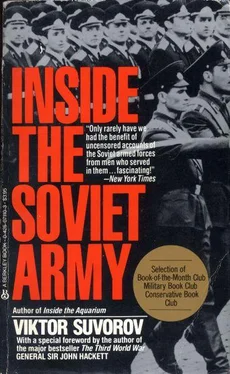Duties and Military Ranks
1
I knocked on the door, waited for permission to enter and went in. The regimental commander, Colonel Dontsov, was standing. Despite this, a major, whom I did not recognise, was sitting by his side. I saluted smartly, clicking my heels as I did so.
`Comrade Colonel, may I have permission to make my report?
`Ask the Major for permission.
I turned quickly to the Major.
`Excuse me, Comrade Major, I am Senior Lieutenant Suvorov. May I report to Colonel Dontsov?
The major nodded, expressionlessly. I report to the colonel on a duty trip I had just finished. He asked a few questions and then nodded, showing that he had no more to say. I again turned to the major.
`Comrade Major, may I have permission to leave?
He said that I might go. I turned and went out.
The situation had been clear to me from the moment I entered. While I had been away from the unit, an officer of greater importance than our regimental commander had arrived, as his superior (and therefore also mine). If this major was more important than the commander of a regiment, he must be the equivalent of at least a deputy divisional commander.
In the corridor I met one of the orderly room clerks and I asked him, `Who's this new major, who is lording it over the boss?
`He's an important man, said the clerk, with some awe. `He is the new divisional chief of staff, Major Oganskiy.
I whistled: from now on I knew whom to salute, whom to click my heels to.
2
The system of awarding military ranks in the Soviet Army is a fairly simple one, but it is different from those used elsewhere and therefore needs to be explained.
The system came into use during the war — effectively at the time of the battle for Stalingrad. In other words, it dates from the time when the Soviet Union first began to aspire to become a super-power. It is designed to take maximum advantage of the rivalry between the officers on each rung of the promotion ladder and to ensure that advancement comes as quickly as possible to the staunchest supporters of the regime — the hardest, most callous, most masterful and most competent.
To achieve this, the Soviet system applies the following simple rules:
1. Seniority depends, not on rank but on appointment. Only when two officers have no professional connection with one another, is seniority determined by rank.
2. An officer's eligibility for a higher appointment depends, not on his rank or length of service, but on his ability to command.
3. The time spent in a particular appointment is not limited in any way. Thus, an officer may command a platoon for the whole of his service or he may be given greater responsibility within a few months.
4. The appointment held by an officer makes him eligible for a particular rank. However, he is not given this rank unless he occupies an adequately responsible place on the ladder of service and has served for a given number of years.
The system for the advancement and promotion of officers in peacetime works in exactly the same way as it did during the war. We will therefore illustrate it with wartime examples.
Imagine that the deputy commander of a battalion is killed in action. A replacement is needed without delay. The battalion commander has only a limited choice. There are three companies in his battalion and the commander of one of these companies must take his deputy's place. In making his choice, the battalion commander will ignore an individual's expectations, his length of service and the number of stars on his shoulderboards. What he needs, quickly, is the man who, in his opinion, will measure up best to new responsibilities. Of the three candidates one is, let us say, a captain, the second a senior lieutenant and the third a lieutenant who arrived recently from his military training school and who has been in command of his company for two weeks. The battalion commander knows that the captain is a heavy drinker, the senior lieutenant is a coward but that the lieutenant is neither of these. He therefore appoints the lieutenant as his deputy. The lieutenant will be promoted to a higher rank later, but the two other officers, with whom he was on equal terms until this moment, are now his subordinates. Shortly afterwards, the battalion commander is killed, at which point our lieutenant automatically takes his place, leaving the post of deputy battalion commander vacant once again. The new battalion commander must now decide — very quickly — who should fill the vacancy. He could select the alcoholic captain, although almost anyone else would be better, or he might choose a lieutenant who is even younger than him, who finished his training even more recently than he did, but who received better marks at the training school than he did himself.
Here are some examples from real-life. The first is from 1944, when the 29th Guards Rifle Division found itself in urgent need of a commanding officer for one of its regiments. Captain I. M. Tretyak was chosen. He was only twenty-one, but he had three and a half years of continuous service in action behind him. During these years he had worked his way steadily up the promotion ladder, having held every rank, one after the other. Understandably, he tended to be chosen whenever an officer was needed for a more responsible post. He was promoted later on but for the time being he commanded the regiment while still a captain. Under his command were eight lieutenant-colonels, and dozens of majors and captains. Subsequently he continued up the ladder with the same speed. Today he is a Marshal.
In 1942 the 51st Army was left without a commanding officer. The senior command decided that the best candidate for this post was Colonel A. M. Kuznetsov. The brigades and divisions in the army were commanded by generals, a general commanded each of the corps and, in four cases, had another general as deputy, the Army's administrative and staff departments bulged with still more generals, but Colonel Kuznetsov suddenly ascended, through their midst, to lead them all. He became the commander — he was the one you had to click your heels to.
The 58th Army, too, was commanded by a Colonel — N. A. Moskvin — in spite of the fact that there were generals galore on the Army's strength. But it was Colonel Moskvin to whom they and all their men became answerable, for he was the man whom the higher command selected as the best officer available. The situation in peacetime remains exactly as it was during the war. The time an officer spends doing a particular job is not limited by any rules or regulations. Young officers arrive from their colleges and are given platoons. The regimental commander has the right to take one of them and put him in command of a company — and he can do this after the officer has been in charge of a platoon for only one day. In his own interests, a regimental commander will always select the harshest, the most demanding, and the most dependable of the officers at his disposal for the post.
A divisional commander appoints his deputy battalion commanders and all officers holding equivalent appointments under him. However, he may only make his choice from officers who have reached the immediately preceding grade — that is from among his company commanders but not from the latter's platoon commanders. In order to rise to the post of deputy battalion commander, a young officer must first please his regimental commander sufficiently to be put in charge of a company and then he must find favour with the divisional commander — without, however, falling out with his regimental commander, who has enough power to ruin the career of any officer who is under his command.
An Army Commander can choose his battalion commanders, but these must come from those who have done the job of deputy battalion commander. The Commander of a Military District can select and appoint deputies for his regimental commanders from any of his battalion commanders. Regimental commanders are appointed by the Minister of Defence.
Читать дальше












